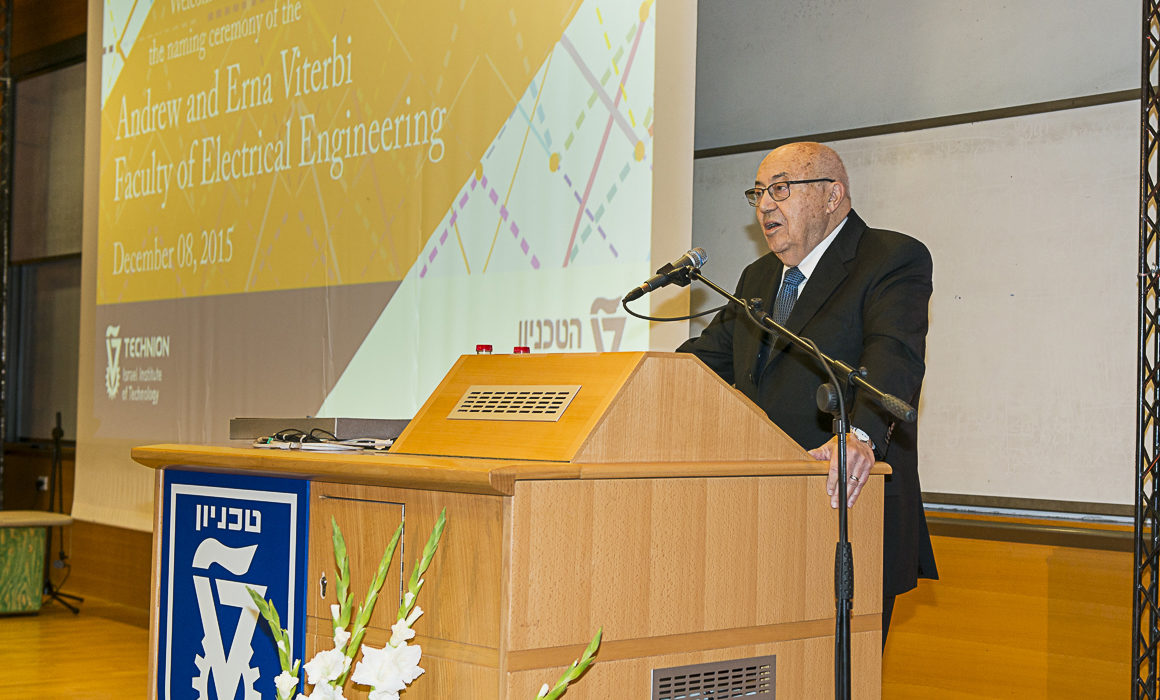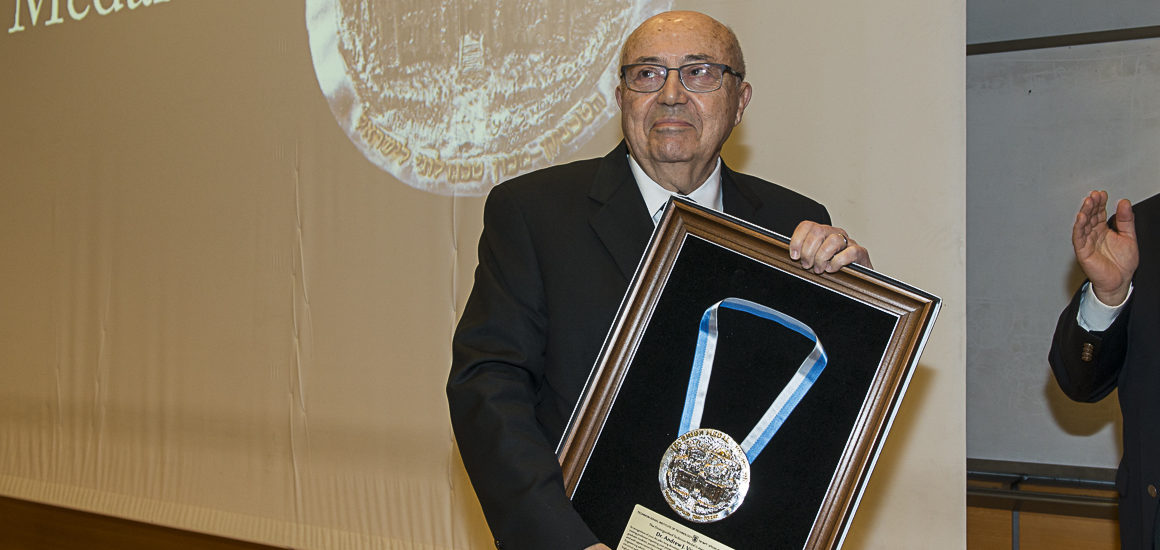Five years ago, Distinguished Visiting Professor Andrew Viterbi made a gift that transformed the Technion and the State of Israel. His generous donation of $50 million to the Technion Faculty of Computer and Electrical Engineering not only enhanced the Technion’s position as an electrical engineering powerhouse. It secured Israel’s place as a global leader in engineering innovation.
Dr. Andrew Viterbi receives Technion’s highest honor, Technion’s Distinguished Medal, during the festivities celebrating the dedication of the Andrew and Erna Viterbi Faculty of Computer and Electrical Engineering, December 8, 2015
As an accomplished computer scientist and entrepreneur, Prof. Viterbi understood the value of the Technion — and is committed to ensuring Technion students and faculty have every resource at their disposal to invent, explore, and imagine.
In just five short years, his groundbreaking $50 million gift has transformed the Technion. Milestones have been reached. Major recognition has been gained and important research findings have been published. And the Faculty of Electrical Engineering — now proudly the Andrew and Erna Viterbi Faculty of Computer and Electrical Engineering — continues to grow at a remarkable pace.
Recruiting the Best and Most Brilliant Faculty
16 new tenured track faculty have been hired since the Viterbis’ gift in 2015. They were recruited from vaunted institutions, including Duke University, University of Toronto, Yale University, Stanford University, MIT, Weizmann Institute, Cambridge University, Cornell University, Columbia University, Princeton University, University of California at Berkeley, and ETH Zurich.
They’re accomplishing amazing things at the Technion. Professor Shahar Kavintsky has developed a revolutionary technology that can turn TowerJazz’s commercial flash memory components into memristors, devices that contain both memory and computing power. The technology, inspired by how the human brain functions, significantly accelerates the operation of artificial intelligence (AI) algorithms.
Such research has earned Prof. Kvatinsky the Pazy Award from the Israel Science Foundation, a prize given to the most outstanding and original project in mathematical and computer sciences. Prov. Kvatinsky has also earned the ERC Starting Grant, the Goldberg Research Prize, and the Krill Award — all in just the past five years!
Professor Tomer Michaeli has been hard at work developing a new microscope that offers scientists a 3D glimpse of cells in action at super-resolution. Dubbed DeepSTORM3D, the microscope is able to map images with a resolution ten times that achievable through standard optical microscopy — revolutionizing the field of biology. Such work has earned Prof. Michaeli the Alon fellowship, awarded to the most outstanding new faculty members across the country and across all academic disciplines.
Prov. Kvatinsky and Prof. Michaeli are not the only ones to attract national and international acclaim. The past five years have seen Viterbi Faculty lauded across Israel and the world for their work in mathematical signal processing, computer vision, photonics, teaching, and more.
Distinguished Professor Jacob Ziv (emeritus) received the EMET Prize, awarded annually for excellence in academic and professional achievements that have far-reaching influence and significant contributions to society. Prof. Ziv was also recently awarded the Institute of Electrical and Electronics Engineers (IEEE) Medal of Honor, the highest award given in the field of electrical engineering.
The Viterbi Faculty of Computer and Electrical Engineering also received the 2017–18 Yanai Award for Excellence in Education, the Technion’s most prestigious prize. The award reflects an extensive investment in all aspects of teaching — including updating curriculum, improving services and facilities for students, and the quality of teaching — and recognizes the immense contribution the Faculty has made to engineering education in Israel.
A Truly Incredible Student Body
Viterbi Faculty of Computer and Electrical Engineering students are no less amazing — and their numbers are growing rapidly. Over the past five years, the student body has ballooned to 2,100 undergraduate students, 105 Ph.D. students (with 80 students full-time), and 304 M.Sc. students (102 of them full-time).
These students truly represent the best of Israeli ingenuity and are already making their mark in their respective fields. The world is taking notice. In 2016, M.Sc. students Maya Barkon and Ester Hait and undergraduate student Mor Shpiggel won the Intel Award. In 2019, Shai Tsesses won the Tingye Li Innovation Prize, awarded to an early career professional who has demonstrated promise in the field of optical fiber communication. Tsesses’ work on optical skyrmions was chosen out of the thousands of applicants who submitted their paper to the Conference on Lasers and Electro-Optics (CLEO), one of the largest global conferences in optics and electro-optics.
And in 2019, Tamar Rott Shaham earned the Google Women Techmakers scholarship for her excellent academic performance, leadership, and impact on the community of women in tech.
These are just a few of the dozens and dozens of awards and fellowships granted to Technion students in the past five years — with more being announced almost every day.
New and Expanded Infrastructure
Prof. Viterbi’s gift has also enabled the Technion to build, upgrade, and expand needed laboratories and facilities. Over 20 laboratories have been completed or are in the final stages of completion since Prof. Viterbi made his gift. Twelve classrooms have been renovated and upgraded. A new wing has been built to support young faculty members, technicians, and graduate students.
In a field as dynamic and competitive as electrical and computer engineering, such additions are not cosmetic — they’re necessary to stay on the leading edge of innovation. We’re already seeing the results of these investments.
For instance, in Prof. Ido Kaminer’s Laboratory for Nanoscopic Electrodynamics (updated in the 2017-2018 school year), researchers have made a dramatic breakthrough in the field of quantum science: a quantum microscope that records the flow of light, enabling the direct observation of light trapped inside a photonic crystal.
This breakthrough is likely to have numerous potential applications, including the design of new quantum materials for storing quantum bits with greater stability, and improving the sharpness of colors on the screens of electronic devices.
Take a tour of Prof. Kaminer’s lab!
In recent months, Prof. Kaminer has been working with an international team of researchers to translate his expertise in the fight against COVID-19. The research team has found that applying UV light on the inside of ventilation systems in buildings and shared indoor spaces when not in use can quickly and effectively deactivate airborne and surface-deposited viruses like COVID-19, in a relatively cost-efficient way. Having some of the best equipment in the world at his disposal has allowed Prof. Kaminer to pivot to new, pressing challenges like the global pandemic — even as he continues his groundbreaking work in quantum science.
Looking Ahead
In just five years, one family’s generous gift has blossomed into talented faculty, promising students, and innovative new equipment and facilities — while generating reams and reams of new research and groundbreaking inventions. Prof. Viterbi’s gift has solidified the Faculty of Electrical Engineering’s position as one of the best and most accomplished in the world; it has elevated the Technion to a global force for science and technology; and it has cemented Israel as the “Startup Nation” and a hotbed of innovation.
Just what will the next five, 10, 50 years bring? We’re not sure — but we cannot wait to see the continued fruits of Prof. Viterbi’s generous investment in the future of the Technion and the State of Israel.
In recent months, Prof. Kaminer has been working with an international team of researchers to translate his expertise in the fight against COVID-19. The research team has found that applying UV light on the inside of ventilation systems in buildings and shared indoor spaces when not in use can quickly and effectively deactivate airborne and surface-deposited viruses like COVID-19, in a relatively cost-efficient way. Having some of the best equipment in the world at his disposal has allowed Prof. Kaminer to pivot to new, pressing challenges like the global pandemic — even as he continues his groundbreaking work in quantum science.
Note: this impact story was corrected in May 2021 to reflect the official renaming of the Faculty of Electrical Engineering at the Technion. It is now known as the Andrew and Erna Viterbi Faculty of Computer and Electrical Engineering.



